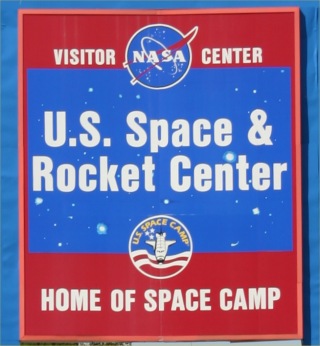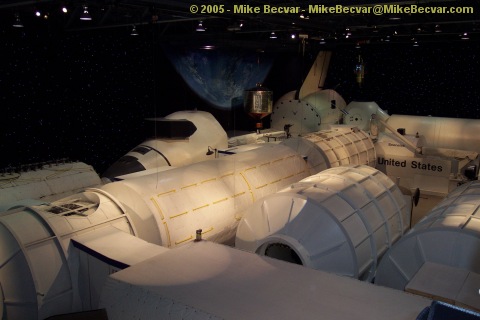Mike's Space Camp 2005 Photos

In September 2005, I attended the Week Long Adult Advanced Space Academy at the
Space Camp in Huntsville Alabama.
Last year, I had attended their weekend program. (See last year's photos)
Each participant selects from either the Pilot or Mission Specialist track. I had selected Mission Specialist. For the adult program, most activities are the same, but the Mission Specialists do more of the science experiments and space walks.
The week long program included several lectures, team building activities, simulations, four short missions and one extended mission.
-- The week begins -- Training and Simulators -- Museum -- Mission Training -- Long Mission -- Rocket Launch and Graduation --
The week begins
I was part one of eleven adults, nine men and two women, participating in the program. Since school had just begun, there weren't any children programs that week. As a result, we had the place pretty much to ourselves.

We began our week's activities by taking a team photo below the Pathfinder.

Outside the Space Camp Habitat (aka dorms). They are designed to look a bit like the space station.

Inside my room in the Space Camp Habitat. Each room had bunk beds with room to sleep seven.

Inside the Space Camp Habitat. Since we were the only group it was very quiet. I could only imagine what it would be like if it was filled with children.
Training and Simulators
Scattered throughout the week, we had time to try out various simulators. Each simulator was designed to teach us a little about what it would be like to travel in space.

We went to Area 51 to complete some team building challenges. We split into two teams and each completed three challenges. My team won the Area 51 challenge.

The Space Camp facility has several Space Shuttle and Space Station simulators in a large room called the Mission Center Complex. We spent most of our time on the Enterprise.

Multi-Axis Trainer (MAT). The trainer simulates the disorientation one would feel in a tumble spin during re-entry into Earth’s atmosphere. The rings are suspended independently and you spin in all directions at once.

1/6th Gravity chair. The chair gives an idea of what it is like to walk on the moon.

We went over to the Aviation Challenge camp twice. While there we learned how to fly their fighter jet simulators.

5 Degrees of Freedom (5DF) chair. The chair simulates Newton's Thrid Law of Motion, push away from the structure in an environment without friction or gravity and you will keep going. The chair also simulates five of the six degrees of freedom of movement available in space: up/down, left/right, back/forth, pitch (leaning forward or backward), roll (tilting to the side), and yaw (turning sideways around a vertical axis). The chair slides around the room on a cushion of air.

Manned Maneuvering Unit (MMU) chair. The chair simulates a jet propelled backpack that helps astronauts work and maneuver in space while unattached to the spacecraft. The simulator was like the 5DF chair, but it had two joysticks that helped controlled motion. The chair still floated on a cushion of air, but also had a wheel that could give a quick push allowing you to move left/right, forward/backward, and rotate.
Museum and Rocket Park

Space Shot, one of the rides in the Rocket Park. The ride simulates the rapid acceleration of a rocket taking off. It gives a brief period of weightlessness when it reaches the top and begins to fall back towards the ground.

The museum had a display of model rockets decorated by local companies at the museum entrance.

Pathfinder Orbiter was initially built in 1977 and used by the National Aeronautics and Space Administration (NASA) to practice handling and moving of actual Space Shuttles. It is now on display in the Shuttle Park at Space Camp.

Mike by the rockets in Rocket Park

Replica Saturn V Rocket in Rocket Park. One of the three remaining Saturn V rockets is also in Rocket Park. It is currently being restored and is on display in a horizontal position.
Mission Training
During the week we had four training sessions and four short missions all designed to prepare us for our extended mission.

Mike learns how to scuba dive in the Underwater Astronaut Trainer (UAT). The UAT is used to simulate a weightless environment and to train for space missions.

Mike in the UAT tank.

View through one of the windows along the side of the UAT tank.

Practice session for Alpha Mission in Mission Control
Extended Mission
The Extended Mission as divided into three parts. The launch of the shuttle, docking with the Space Station, and returning to Earth on the shuttle. We split into two groups, eight people on the shuttle/space station and three people in Mission Control. The day began with a steak and egg breakfast, presentation of our mission patch on a cake, and team photo. On the mission we had to solve several problems and deal with medical emergencies.

Before our final mission, they baked us a cake and decorated it with our mission patch. They presented the cake a breakfast.

Team ready to board the space shuttle for the long mission.

Mike and three other team members sit on the shuttle and get ready for takeoff on the extended mission.

On the last part of the Extended Mission, Bob and I made a space walk to repair a satellite. Bob leaves the shuttle in his space suit.

Mike, also in a space suit, on the Canada Arm repairing a satellite.
Rocket Launch and Graduation
One afternoon, we spent a few hours building model rockets. Most of us built a two stage rocket from a kit. After our Extended Mission, we went over to Area 51 to launch our rockets. The two stages of my rocket failed to separate and didn't go very far, but the parachute deployed and I was able to recover the rocket.

Several members of the team gather with their model rockets.

Getting ready to launch the model rockets.

Launching the model rockets.

We ended the week with a graduation ceremony.